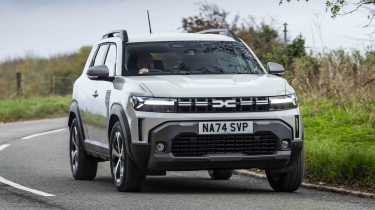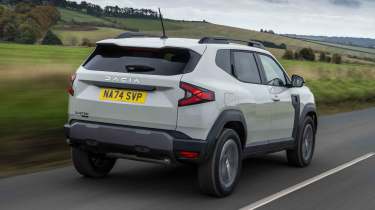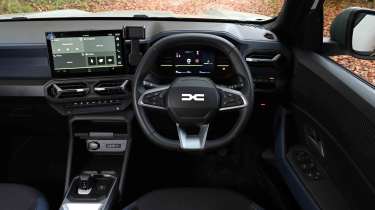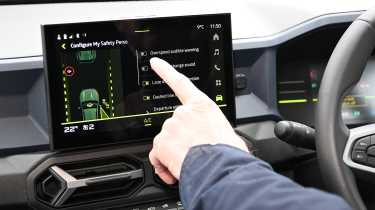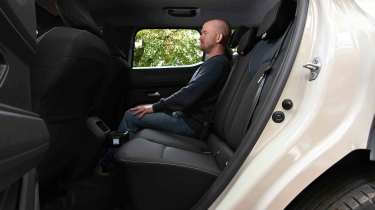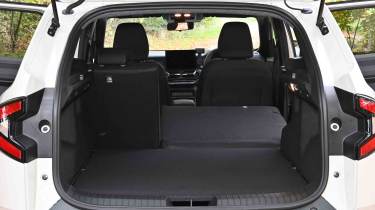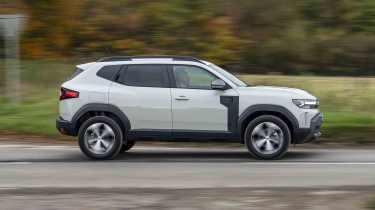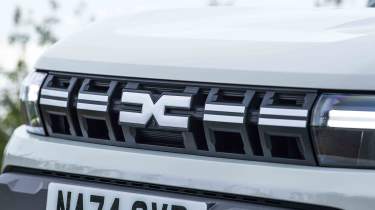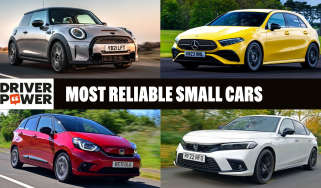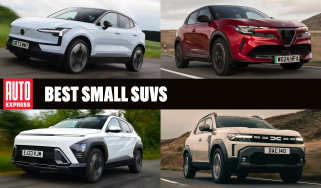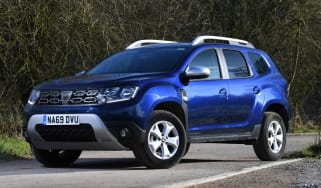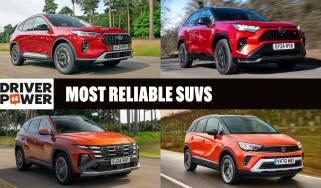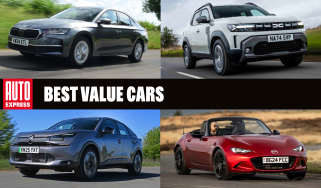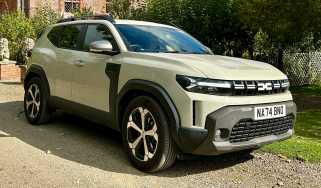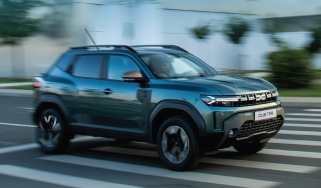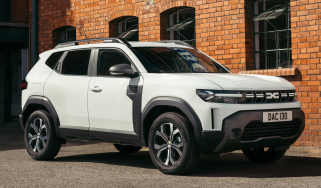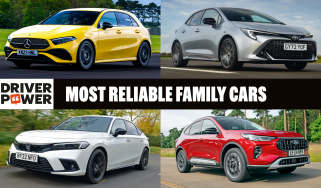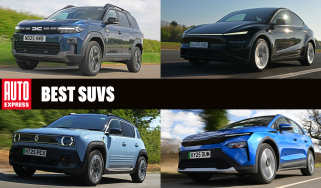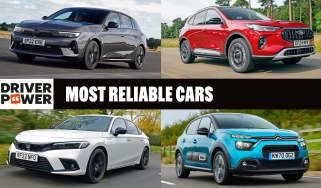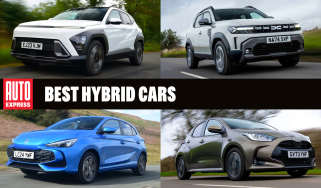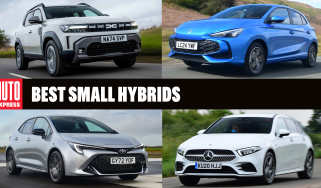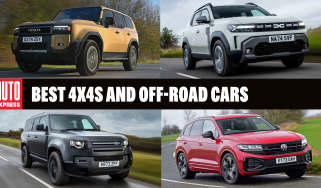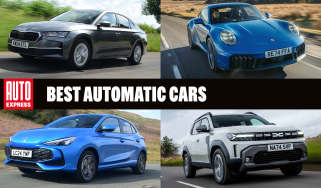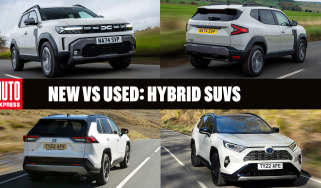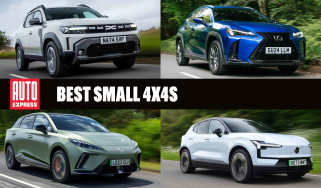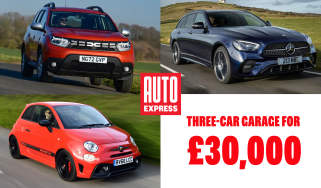Dacia Duster review
The latest Dacia Duster has ditched diesel power and become even more desirable

Our opinion on the Dacia Duster
Buyers are spoiled for choice when it comes to family SUVs, but finding something that offers maximum value for money is tricky. The Dacia Duster has always delivered its own unique charm in a class where many cars try to be sporty or aggressive, and the Romanian brand has carved out its own niche once again with the third-generation model.
We’re pleased to report that the Duster hasn’t lost its way, because this SUV still offers genuine appeal and practicality at an affordable price. It’s not the most refined or luxurious SUV for sale, but this car’s honesty makes it easy to enjoy, while the tough yet modern looks mean it can turn heads.
The latest Duster uses the same CMF-B platform as the Dacia Jogger, plus Renault’s Clio and Captur, and that means it has taken a significant step forward from its predecessor, with technological improvements and a generally grown-up feeling on the road.
About the Dacia Duster
The simple, honest Dacia Duster was launched in Europe in 2010 and went on sale in the UK in 2013. Since then, more than 2.4 million Dusters have been sold worldwide, with hundreds of thousands finding homes here in Britain.
Dacia has enjoyed big success with customers who prioritise value for money above anything else. This formula still applies with the latest Duster, although it combines this with an element of adventure as Dacia attempts to move away from being solely a budget brand. At a time when you’ll pay over £26,000 for a basic Ford Puma, and the Renault Captur starts at almost £22,500, the latest Duster is available from under £22,000.
Used - available now

2023 Dacia
Duster
13,707 milesAutomaticPetrol1.3L
Cash £16,250
2022 Dacia
Duster
25,912 milesManualPetrol1.0L
Cash £12,461
2022 Dacia
Duster
28,976 milesManualPetrol-lpg1.0L
Cash £12,690
2022 Dacia
Duster
66,087 milesAutomaticPetrol1.3L
Cash £11,990What’s even more impressive is that the latest Duster isn’t just a heavy facelift – it’s an all-new car. It sits on the Renault Group’s CMF-B platform that also underpins the Renault Clio, as well as the Dacia Sandero and Dacia Jogger.
We’ve tested the budget-friendly family car extensively so far in petrol, hybrid and 4x4 guise. We also put it up against the MG ZS in a UK twin test. The Dacia saw off its Chinese foe thanks to its unique design, off-road capability and slightly lower starting price.
Our chief sub-editor, Andy Pringle, also lived with a Dacia Duster Hybrid in Journey trim for six months when it was on our long-term test fleet. The car’s strong real-world efficiency and high levels of interior and luggage space were two strong points in Andy’s eyes, but problematic tech and noisy motorway journeys did expose Dacia’s cost-cutting measures.
Dacia Duster prices and latest deals
There’s no denying the Duster’s budget-friendly credentials, thanks to its sub-£22,000 starting point, but the price you pay starts to climb once you work your way through the trim and powertrain options. Opt for the range-topping Extreme model powered by the full-hybrid TCe 140 set-up, and you’ll be looking at a price of around £27,500. That being said, this is still a bargain compared with the Hyundai Kona Hybrid, which starts from nearly £31,000. Regardless of your chosen spec, there are very few competitors that can beat the Duster on price.
If you want to save even more money, you can spec your ideal Dacia Duster via the Auto Express Buy a Car service. Here you’ll find average savings of around £1,300 on the list price, as well as plenty of new, in-stock Dacia Dusters and used Dacia Duster deals. We can also help you to sell your current car.
Performance & driving experience
Pros |
|
Cons |
|
The Duster focuses on comfort, which sets it apart from many of its similarly sized SUV rivals. So-so performance and slightly wallowy handling are compromises we’re happy to accept, given the ride quality and low price point, but in some ways it feels like refinement has taken a slight step back compared with its predecessor.
As with most small SUVs, the Dacia Duster is front-wheel drive as standard, but a four-wheel drive system is available with the TCe 130 powertrain. This can handle more arduous terrain than your standard muddy farm track or boggy festival car park.
The Duster 4x4 also comes with a slightly taller ride height and 217mm of ground clearance, while there are drive modes for handling snow, mud/sand and general off-roading, plus hill descent control (which works in forward or reverse) that keeps the car moving at 5mph.
Approach and departure angles have been improved over the last Duster, and the 4x4 system can swap power between the axles for steep descents or precarious climbs. We tried the Duster 4x4 and were amazed at the obstacles it could conquer, even on road-biased all-season tyres.
The infotainment screen can show the car’s slip angles and off-road settings, which is helpful, although we’d like the front and rear cameras to have a higher screen resolution to allow the driver to spot obstacles more effectively. We managed to get the Duster to a 25-degree side angle, although we were told that during testing, 40 degrees was achieved, which is five degrees more than a Mercedes G-Class can do.
| Model | Power | 0-62mph | Top speed |
| TCe 130 | 128bhp | 9.9s | 111mph |
| TCe 130 4x4 | 128bhp | 11s | 111mph |
| Hybrid 140 | 138bhp | 10.1s | 105mph |
Performance, 0-60mph acceleration and top speed
One of the big stories for the third-generation Duster is that a full-hybrid powertrain is offered for the first time. It’s a set-up we’ve already sampled in the seven-seat Jogger, plus several Renaults. The 1.6-litre petrol engine is paired with a couple of electric motors: a main 49bhp unit to deal with propulsion, plus another smaller one working on brake regeneration and taking the place of a traditional starter motor. This set-up sends drive through a multi-mode clutchless gearbox, which Renault claims is more efficient than conventional dual-clutch or torque-converter autos. Output stands at 138bhp and 205Nm.
The powertrain that will make sense to most buyers is the more conventional petrol mild-hybrid. The 1.2-litre three-cylinder turbocharged engine makes 128bhp and 230Nm, with drive sent exclusively through a six-speed manual gearbox. This option is available with either front or four-wheel drive.
The fastest-accelerating Dacia Duster is the TCe 130 with front-wheel drive. It has an official 0-62mph time of 9.9 seconds, which is 0.2 seconds faster than the Hybrid. Although the latter has an extra 10bhp, it’s not enough to overcome the added weight of the hybrid system and make it the fastest Duster, while the standard automatic gearbox also has an impact on its time.
Add four-wheel drive to the TCe 130 and this makes it slower: a 0-62mph time of exactly 11 seconds is quoted by Dacia.
Town driving, visibility and parking
The first thing that strikes you in the new Duster is how softly it rides. Compared with so many rivals that try to trick buyers into a sense of sportiness – when in fact all they’re getting is a hard suspension set-up – the way that the Duster gently wallows from one bump to the next is both refreshing and calming.
The smoothness of the hybrid powertrain helps here, too; at low speeds and with gentle throttle openings, it feels slick and switches between petrol and electric modes almost seamlessly – the one small exception being an occasional grabbiness from the motor regeneration when slowing.
The manual gearbox in the mild-hybrid petrol is fine, but would be improved by a less spongy response from the clutch pedal.
Country road driving and handling
A soft ride means that the Duster isn’t a car that encourages you to chuck it around a series of corners. In fact, it feels a touch more nose-heavy than the last Duster, so it’s not a choice for the keen driver. Driven at a more gentle pace, it’s capable enough and still grips the road well. The steering is quite light and vague around the straight-ahead, but becomes heavier and more precise as extra lock is applied.
The hybrid system feels a little more out of its depth at higher speeds, with that multi-mode gearbox often clinging on to a low ratio for too long after a burst of acceleration or steep uphill section, resulting in a lot of wailing from the four-cylinder petrol engine.
Motorway driving and long-distance comfort
That soft ride makes motorway cruising a relaxing experience. It’s a shame, then, that the Duster’s bonnet and A-pillars generate a lot of wind noise at speed, to the point where it’s more noticeable than in the previous-generation car. It’s a gripe that becomes more apparent because elsewhere it feels like a step forward; road noise is more muted than before, and once the hybrid system settles down, it’s not very intrusive either. The mild-hybrid petrol model is quieter still.
“The light steering made manoeuvring easy, and the various cameras were a great help when parking. I love the Dacia’s chunky styling, but it makes it very hard to judge where the extremities are without hi-tech help. As it stands, it can only show one camera’s view at a time.” - Andy Pringle, chief sub-editor.
MPG & running costs
Pros |
|
Cons |
|
During our time behind the wheel of the Duster Hybrid we averaged 52.3mpg – not far shy of the official WLTP figure of 55mpg. However, given the complex nature of the hybrid tech, that’s not really much of an improvement when compared with the mild-hybrid model, which is claimed to achieve 51mpg; we saw 46.3mpg during a few hours of driving. Adding four-wheel drive to the mild-hybrid reduces its claimed efficiency down to 46mpg, so expect this to be around 40mpg in the real world.
Granted, the mild hybrid is only available with a manual gearbox, but it costs around £3,000 less than the full hybrid and is very slightly quicker on paper, so for those who don’t need an auto gearbox, it’s the model that will make the most financial sense. Either way, the Duster is impressively cheap beside most rivals, which counts hugely in its favour.
| Model | MPG | CO2 | Insurance group |
| TCe 130 | 51mpg | 124g/km | 24 |
| TCe 130 4x4 | 46mpg | 135g/km | 24 |
| Hybrid 140 | 55mpg | 114g/km | 24 |
Insurance groups
The majority of the Duster line-up falls into insurance group 24, although the entry-level model is in group 17. Those are higher group ratings than for the previous model, as well as compared with other small SUVs, but the Duster should still be affordable to insure.
Tax
With no fully electric option or even a long-range plug-in hybrid powertrain, the Duster doesn’t offer particularly tempting rates for company car drivers, but it’s a compromise worth making to keep the price low for private buyers.
Thanks to affordable pricing, even the most expensive Duster costs well under the £40,000 limit that would require an additional luxury car tax surcharge. Private buyers will get a small discount going for the Hybrid 140 when compared with the TCe 130 mild-hybrid petrol version, because this is classed as an alternative-fuel vehicle.
Depreciation
A competitive starting price has resulted in strong residual values for the Duster. As the priciest model in the range, the Hybrid is expected to depreciate the most, but even so, all models should hold on to between 51 to 64 per cent of their value after three years or 36,000 miles.
In comparison, the Renault Captur is expected to hold on to between 51 to 55 per cent of its original value over the same period, while the combustion-powered Ford Puma manages 47 to 53 per cent.
To get an accurate valuation for a specific model, check out our free car valuation tool...
Interior, design & technology
Pros |
|
Cons |
|
The third-generation Duster has adopted a tough new look, with more thought being put into not only its overall shape, but many of the finer details, too. The squared-off bonnet edges give a distinctive appearance from behind the wheel, but also help the driver to place the front of the car in tight spots. Chunky plastic cladding surrounds the lower portions of the car, too.
The Duster has always been known for its no-nonsense cabin designs that border on the old-fashioned, but this new model has maintained its predecessor’s honest feel while adding some style and one or two useful features.
Interior and dashboard design
Much more effort has been put into the look of the new car’s cabin. There are still Renault parts, but they’re well integrated; the bank of physical toggle switches for the climate controls (borrowed from the Renault Clio and Captur) is a great touch, and Renault’s familiar media control stalk behind the steering wheel is still among the most usable designs of its type. Oddly, though, the main volume controls aren’t easy to find; they’re on top of the display.
Driver-assist functions can irritate some drivers, but Dacia has made turning them off easy with a ‘Perso’ setting. This mode lets you choose the features that you want (and don’t want) and store them in a preset mode. This can then be accessed via a button to the right of the steering wheel.
Materials and build quality
Subtly coloured and textured finishes do a decent job of distracting from the fact that everything is finished in hard plastics. In a car that pitches itself as a bit rugged, this seems like an appropriate way to save some cash. The centre console doesn’t feel particularly sturdy, though.
Infotainment, sat-nav and stereo
A digital dashboard is quite a novel introduction for the Dacia family. As you’d expect, its layout is fairly simple, but it works well. The graphics look very sharp, and the green colour scheme continues the outdoorsy theme, while large buttons on the steering wheel make it easy to scroll through modes.
Dacia has furnished all versions of the Duster bar Essential trim with a 10.1-inch touchscreen infotainment display. It has a simple yet bright colour palette that is easy to read and looks contemporary. The same can’t be said when you engage reverse, because the cameras are very low-resolution, relaying a pixellated image back to that big screen. That aside, it’s a decent system for the money.
Top-spec versions of the Duster feature the Media Nav Live system that comes with eight years of connected services. The loading times are okay, and programming a navigation route is fairly straightforward thanks to a decent on-screen keyboard size.
“I like the way you can personalise the driver settings through the touchscreen, then apply them at the start of each trip with just two button presses.” - Andy Pringle, chief sub-editor.
Boot space & practicality
Pros |
|
Cons |
|
Interior and boot space are Duster strong points, especially given its still-modest exterior dimensions. A lofty driving position and low window line boost visibility, although the view to the rear isn’t as good as we’d like. The bonnet extends quite far out in front, but you can get a feel for the edges of the car, helping you to place the Duster on the road.
Dacia has also introduced what it calls the YouClip attachment system, which allows a variety of accessories to be secured in various places around the cabin, including beside the main infotainment display, on the back of the front seats and at the base of the centre console in the rear. Available kit includes a three-in-one accessory that combines a cup-holder, bag hook and LED torch. You can also find smartphone and tablet holders, storage bags and hooks to choose from, all ranging from around £10-£40.
Dimensions and size
The Duster uses a platform that’s shared with a supermini, but the Dacia feels spacious inside. The current Duster is slightly longer and wider than the previous model at 4,343mm long, 1,921mm wide and 1,656mm tall. It isn’t quite as tall as it was before, but it still has a height advantage over the likes of the Skoda Kamiq.
| Dimensions comparison | |||
| Model | Dacia Duster | Renault Captur | Skoda Kamiq |
| Length | 4,343mm | 4,239mm | 4,241mm |
| Width | 1,813mm | 1,797mm | 1,793mm |
| Height | 1,621mm | 1,576mm | 1,534mm |
| Wheelbase | 2,660mm | 2,640mm | 2,650mm |
| Boot space | 472 to 1,609 litres | 422 to 1,363 litres | 400 to 1,395 litres |
Seats & passenger space
A wide range of adjustment for both the seat and the steering wheel makes it easy for Duster drivers of all sizes to find a comfortable seating position. You will need the top-of-the-range Extreme trim to get adjustable lumbar support for the driver, though. Meanwhile Expression trim and above include a sliding armrest, improving comfort on longer journeys and providing additional storage. The small rear window and rear side windows limit over-the-shoulder visibility somewhat, but at least the door mirrors are large.
While the Duster doesn’t feel any more posh in the back, space is a strong point. Headroom is very impressive in particular, with our measurements putting it ahead of similarly priced rivals such as the MG ZS and very close to larger family SUVs such as the Kia Sportage. Kneeroom is competitive, too, while the soft seats feel comfortable – even for a third passenger in the fairly wide, flat middle seat. There’s loads of foot room beneath the front seats, and only a small centre hump in the floor.
The ISOFIX points are accessible behind zipped covers, which makes them a little more fiddly to get to than in rival cars. The door bins in the back are tiny, too.
Boot space
Boot capacity depends on the Duster’s powertrain. A battery beneath the boot floor means that the Hybrid model offers 472 litres of volume compared with the petrol’s 517 litres. This extra volume is gained below a false floor, so in every version there’s a large area with which to play.
A high boot lip makes it a little tricky to load heavy items on board, but the rear seat backs drop almost completely level with the boot floor, so items slide in easily.
Towing
Engine choice also affects the Duster’s towing capacity. The hybrid is the least capable in this department, with a maximum towing capacity of 750kg. If you’ve got things to haul, the TCe 130 engine in either front or four-wheel-drive guise can pull up to 1,500kg.
“Everything we wanted to take fitted in the car – that’s the three of us, a few soft toys, several bags and what looked like our own body weight in snacks. Above all, most of it went in the boot, and thanks to the square shape of the load area and the adjustable floor being set level with the load lip, it was child’s play to pack and unpack.” - Andy Pringle, chief sub-editor.
Reliability & safety
Pros |
|
Cons |
|
A 29th-place finish out of 31 brands in the most recent Driver Power car manufacturers’ standings puts Dacia towards the very bottom half of the table. However, it’s worth noting that the previous Dacia Duster finished in a very respectable ninth place in the best cars to own league. Owners were unsurprisingly thrilled with the value for money on offer.
However, a three-star Euro NCAP safety rating is rather underwhelming, and this is caused by a shortfall of driver-assistance systems and a merely adequate Adult Occupant Protection mark.
On a positive note, the Duster was praised for its strong passenger compartment, but it’s a little worrying that in the frontal impact tests, chest protection for both the driver and passengers seated in the back was rated as being marginal.
There are more safety features on this Dacia Duster than on any previous model to help prevent you from getting into a collision in the first place. Among them are automatic emergency braking, traffic-sign recognition, a speed-limit alert, rear-parking assist, lane-departure warning, lane-keep assist and driver-attention alert.
Many drivers can find these systems intrusive, but the Duster’s solution is a ‘My Safety’ button on the dashboard, which drivers just have to press twice in order to activate a personalised mode for the ADAS suite.
| Euro NCAP safety ratings | |
| Euro NCAP safety rating | 3 stars (2024) |
| Adult occupant protection | 70% |
| Child occupant protection | 84% |
| Vulnerable road user protection | 60% |
| Safety assist | 57% |
Buying and owning
- Best buy: Dacia Duster TCe 130 Extreme
The Duster is cheap enough that opting for the highest spec car is actually quite a sensible choice. Extreme trim will bring the maximum amount of kit for under £3,000 more than the base Expression model. We don’t see the point in investing in the full-hybrid powertrain, though, because the efficiency benefits are minimal compared with the mild hybrid.
Dacia Duster alternatives
The Dacia Duster finds itself in a relatively unique position, because it’s larger than most SUVs at the same price point. There’s no end of small SUVs to choose from, though, with the Citroen C3 Aircross and MG ZS being two of the Dacia’s closest competitors on price.
If you’re prepared to spend a bit more, the Hyundai Kona is a former Auto Express Car of the Year, and it’s available in petrol, hybrid and fully electric forms. If you prefer the rugged look, you may instead be charmed by the Jeep Avenger, or, if you want to enjoy some driving fun, we’d point you towards the Ford Puma or SEAT Arona.
While the Duster can be specced as an efficient hybrid, the Toyota Yaris Cross has a significant edge in terms of efficiency, and this can also be had in four-wheel-drive form.
Deals on the Dacia Duster and alternatives
Frequently Asked Questions
The Dacia Duster comes with a three-year, 60,000-mile warranty, plus free roadside assistance. But annual servicing at a Dacia dealership extends the warranty cover until the car is seven years old or has covered 75,000 miles.

